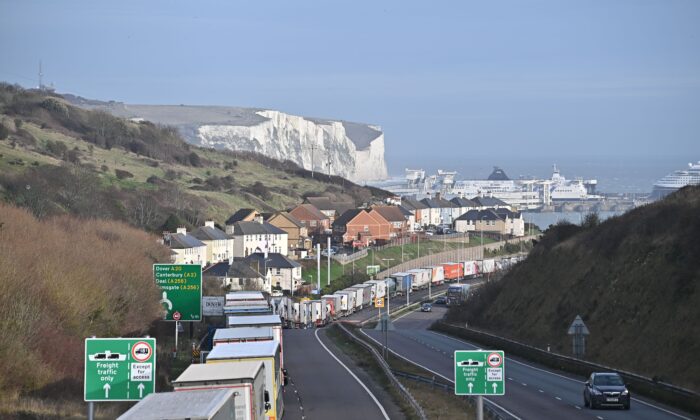
British government has been “largely successful” in its handling of post-Brexit border issues with the EU, but it has relied on temporary measures that are “not sustainable,” the UK’s National Audit Office (NAO) said in its latest report.
much-feared long queues at the UK-EU border did not materialise at the end of the Brexit transition period on Jan. 1, 2021, as the government “successfully introduced systems, infrastructure, and resources to allow the trading of goods to continue,” said the report, which was published on Nov. 5.
But the absence of long queues was “partially due to traffic flows being reduced because of stockpiling, traders’ wariness about the new import controls, and the impact of the pandemic,” the NAO said.
pressure at the border was also relieved by the fact that the UK government has delayed three times the introduction of full import controls on goods from the EU.
But the report noted that the current model of controls “cannot go on indefinitely,” as more controls are due to be phased in over the first half of 2022.
NAO warned that there is still a “significant risk” that traders and hauliers will not be prepared for full import controls, which would reduce the flow and availability of food and other products to the UK.
On the Northern Ireland Protocol, the NAO said there remains “considerable uncertainty” in the “inherently challenging” situation. It urged the government to implement any deal reached with the EU on changing the protocol quickly.
Gareth Davies, the head of the NAO, said his organisation recognises the “significant achievement” in the initial handling of the border issues at the end of the transition period.
But he said, “this was done in part by using interim measures and by delaying the introduction of full import controls.”
“Much more work is needed to put in place a model for the border that reduces the risk of non-compliance with international trading rules, does not require any temporary fixes, and is less complicated and burdensome for border users,” he said.
Trade with the EU has recovered slightly after falling 44 percent in the first quarter of 2021 but remains 13 percent below the level of the last three months of 2020.
report said it was not possible to disentangle the impact of Brexit from the impact of the COVID-19 pandemic, but “reductions in the UK’s trade with the EU are significantly greater than the UK’s trade with the rest of the world over the same period.”
Dame Meg Hillier, chair of the House of Commons Public Accounts Committee, said: “Leaving the EU has meant businesses have had to grapple with more paperwork and additional cost. Government must help businesses adapt to the new rules and put in place border controls that work for all.”
PA contributed to this report.

NEW

2hr

3hr

17hr

17hr

17hr
Pezou : UK’s Post-Brexit Border Measures ‘Not Sustainable’: Report
